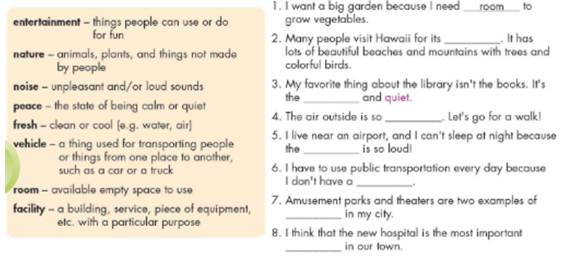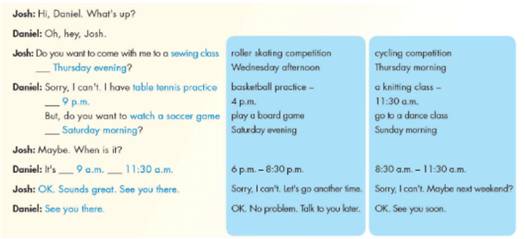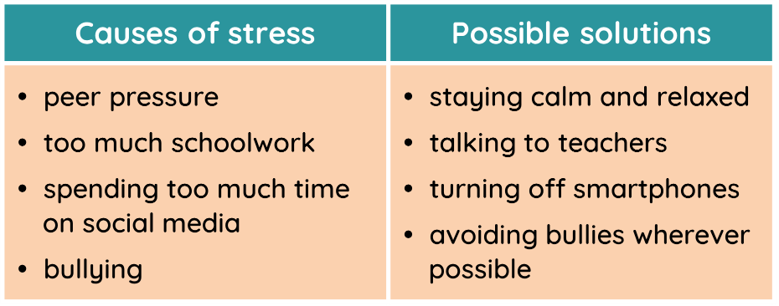Hãy nhập câu hỏi của bạn vào đây, nếu là tài khoản VIP, bạn sẽ được ưu tiên trả lời.

Đáp án:
1. room | 2. nature | 3. peace | 4. fresh |
5. fresh | 6. vehicle | 7. entertainment | 8. facility |
Hướng dẫn dịch:
giải trí - những thứ mọi người có thể làm để vui vẻ
tự nhiên - động vật, thực vật và những thứ không làm ra từ con người
tiếng ồn - âm thanh khó chịu hoặc lớn
bình yên - trạng thái bình tính hoặc lặng yên
tươi - sạch hoặc mát (ví dụ: nước, không khí)
xe cộ - một thứ được sử dụng để vận chuyển người hoặc vật từ nơi này sang nơi khác, chẳng hạn như ô tô hoặc xe tải
phòng - có sẵn không gian trống để sử dụng
trang thiết bị - một tòa nhà, dịch vụ, thiết bị, v.v. với một mục đích cụ thể
1. Tôi muốn có một khu vườn lớn vì tôi cần chỗ để trồng rau.
2. Nhiều người đến thăm Hawaii vì tự nhiên của nó. Nó có rất nhiều bãi biển và núi đẹp với cây cối và các loài chim đầy màu sắc.
3. Điều tôi thích nhất về thư viện không phải là sách. Đó là yên bình và yên tĩnh.
4. Không khí bên ngoài thật trong lành. Chúng ta hãy đi dạo!
5. Tôi sống gần sân bay, và tôi không thể ngủ vào ban đêm vì tiếng ồn quá lớn!
6. Tôi phải sử dụng phương tiện giao thông công cộng hàng ngày vì tôi không có phương tiện đi lại.
7. Công viên giải trí và nhà hát là hai ví dụ về giải trí trong thành phố của tôi.
8. Tôi nghĩ rằng bệnh viện mới là cơ sở quan trọng nhất trong thị trấn của chúng tôi.

1. hometown: a person's place of birth
(quê hương: nơi sinh của một người)
2. folk: traditional to a group of people or a place
(dân gian: truyền thống cho một nhóm người hoặc một nơi)
3. tug of war: a game that two teams hold a rope and try to pull the hardest
(kéo co: một trò chơi mà hai đội cầm một sợi dây và cố gắng kéo mạnh nhất)
4. jump rope: a game that two people hold a rope and one or more people jump over it
(một trò chơi mà hai người giữ một sợi dây và một hoặc nhiều người nhảy qua nó)
5. pick: to take flowers or fruit from the plant or tree where they are growing
(hái, nhặt: lấy hoa hoặc quả từ cây hoặc cây nơi chúng đang phát triển)
6. spinning tops: a game that players use wooden toys which spin very quickly
(con xoay: một trò chơi mà người chơi sử dụng đồ chơi bằng gỗ quay rất nhanh)
7. herd: to make animals move together as a group
(chăn thả: để làm cho động vật di chuyển cùng nhau như một nhóm)

Learning a language is, in some ways, like learning how to fly or play the piano. There some differences, but there is a very important similarity. It is this: learning how to do such things needs lots of practice. It is never enough simply to “know” something. You must be able to “do” things with what to know. For example, it is not enough simply to read a book on how to fly an aeroplane. A book can give you lots of information about how to fly, but if you only read a book and then try to fly without a great deal of practice first, you will crash and kill yourself. The same is true of learning the piano or learning a foreign language. Can you speak English well without having lots of practice? “Practice makes perfect” is what every learner of a foreign language should know.
1. Learning a foreign language and learning to fly are the same in an important way.
2. Information about flying from books is enough for someone to fly. T
3. It is dangerous to try to fly without any real practice.F
4. Talking to a native speaker can be a good way to speak English well.T
5. Language learners can make their English perfect without practice.F
Điền T or F
Read the passage, then write true (T) or false (F) for the following sentences.
Learning a language is, in some ways, like learning how to fly or play the piano. There some differences, but there is a very important similarity. It is this: learning how to do such things needs lots of practice. It is never enough simply to “know” something. You must be able to “do” things with what to know. For example, it is not enough simply to read a book on how to fly an aeroplane. A book can give you lots of information about how to fly, but if you only read a book and then try to fly without a great deal of practice first, you will crash and kill yourself. The same is true of learning the piano or learning a foreign language. Can you speak English well without having lots of practice? “Practice makes perfect” is what every learner of a foreign language should know.
1. Learning a foreign language and learning to fly are the same in an important way. T
2. Information about flying from books is enough for someone to fly.T
3. It is dangerous to try to fly without any real practice.F
4. Talking to a native speaker can be a good way to speak English well.T
5. Language learners can make their English perfect without practice.F

1. play
2. are
3. to
4. you
5. an
6. lots
7. book
8. yourself
9. playing
10. without
Learning a language is, in some way, like learning how to fly or (1) ___play____ the piano. There (2) ___some_____ important differences, but there is a very important similarity. It is this: learning how
(3) ___to__ do such things needs lots of practice. It is never simply to “know” something. You must be able to “do” things with what (4) you___know. For example, it is not simply enough to read a book on how to fly (5) __an_____ aeroplane. A book can give you (6) ___lots____of information about how to fly, but if only read a (7) __book_____ and then try to fly without a great deal of practice first, you will crash and kill (8) ___yourself____ . The same is true of (9) __playing____ the piano. So you think it is simply enough to read about it? Can you play the piano (10) ____without___ having lots of practice first?

cuộc thi trượt patin chiều thứ Tư tập bóng rổ - 4 giờ chiều chơi trò chơi trên bàn buổi tối thứ Bảy | thi đua xe đạp sáng thứ Năm lớp học đan- 11:30 sáng đi đến lớp học khiêu vũ sáng Chủ nhật |
6 giờ chiều -8.30 tối. Xin lỗi, tôi không thể. Để lúc khác nhé. OK. Không có gì. Nói chuyện với bạn sau. | 8:30 sáng-11:30 sáng Xin lỗi, tôi không thể. Có lẽ cuối tuần tới? OK. Hẹn sớm gặp lại. |
Đáp án:
Josh: Hi, Daniel. What's up?
Daniel: Oh, hey, Josh.
Josh: Do you want to come with me to a sewing class on Thursday evening?
Daniel: Sorry, I can't. I have table tennis practice at 9 p.m. But, do you want to watch a soccer game on Saturday morning?
Josh: Maybe. When is it?
Daniel: It's from 9 a.m. to 11:30 a.m.
Josh: OK Sounds great. See you there.
Daniel: See you there.
Hướng dẫn dịch:
Josh: Chào, Daniel. Dạo này thế nào?
Daniel: Oh, chào, Josh.
Josh: Bạn có muốn đi cùng tôi đến lớp học may vào tối thứ Năm không?
Daniel: Xin lỗi, tôi không thể. Tôi có buổi tập bóng bàn lúc 9 giờ tối. Nhưng, bạn có muốn xem một trận bóng đá vào sáng thứ Bảy không?
Josh: Có thể. Khi nào?
Daniel: Từ 9 giờ - đến 11:30 sáng.
Josh: OK, Nghe tuyệt đấy. Hẹn gặp bạn ở đó.
Daniel: Hẹn gặp bạn ở đó.

-We are giving the speech that recalls the history of Tay Son – Binh Dinh and Emperior Quang Trung as well as the resistance against Thanh Dynasty in the 18th century.
-We are having the material art performance with the participation of famous masters in the traditional martial arts of Binh Dinh
-We are holding the fighting music show of Tay Son, which is performed by skillful players – masters with a high level of both martial arts and drum playing.
-We are having the performance that describes the battle in Dong Da between the Tay Son army and Thanh army.

I think teenagers are as stressed as adults because of many reasons related mainly to school, friends and family.In fact, doing well at school involves a lot of pressure, because they have to complete school work, projects and reports and study hard for exams.Then, there is also the stress of having a social life and being accepted by their peers in popular groups in addition to the physical stress which result from some emotional and physical changes which can leave adolescent confused and stressed.Finally, we can mention also the stress that comes from family problems and sibling rivalry.To sum up, we can say that a lot of reasons can led teenagers to stress, which can provoke violent reactions, depression and health problems.
According to me, there are a lot of reasons of stress and pressures. Firstly, as a student, i have to complete a number of assignments at school and at home as well. Moreover, besides subjects, we also have many activies after school, such as physical activities. Students sometime feel under pressures of acheiving goal in sporty competition. Finally, we can mention the stress come from family problems, such as parent’s fight, divorce. All in all, the over-expectation from parents and the overwhelming study scheme at schools are to blame for the significant problem of students’ stress. It is, therefore, suggested that both schools and parents must take actions to cope with this problem effectively.
I think teenagers are as stressed as adults because of many reasons related mainly to school, friends and family.In fact, doing well at school involves a lot of pressure, because they have to complete school work, projects and reports and study hard for exams.Then, there is also the stress of having a social life and being accepted by their peers in popular groups in addition to the physical stress which result from some emotional and physical changes which can leave adolescent confused and stressed.Finally, we can mention also the stress that comes from family problems and sibling rivalry.To sum up, we can say that a lot of reasons can led teenagers to stress, which can provoke violent reactions, depression and health problems.
According to me, there are a lot of reasons of stress and pressures. Firstly, as a student, i have to complete a number of assignments at school and at home as well. Moreover, besides subjects, we also have many activies after school, such as physical activities. Students sometime feel under pressures of acheiving goal in sporty competition. Finally, we can mention the stress come from family problems, such as parent’s fight, divorce. All in all, the over-expectation from parents and the overwhelming study scheme at schools are to blame for the significant problem of students’ stress. It is, therefore, suggested that both schools and parents must take actions to cope with this problem effectively.

Read the passage then choose the true (T) or false (F) statement.(2marks)
How Nam has improved his English.
"...In the first semester of grade 7, I had some difficulties in learning English. My pronunciation of English was really bad and my English grammar was worse. I didn't know how to improve.One day, my English teacher took me to the school library and showed me cassettes of pronunciation drills. She also told me how to use an English - English dictionary to improve my English grammar.I made much progress and only short time later I got excellent grades in English. Now I like learning English best. "
1. Nam's English is poor in the first semester of grade of 7. True
2. He improved his English himself. False (with the help of teacher)
3. His teacher told him how to learn new words. False (improve pronunciation and grammar)
4. He is good at English now. True
Read the passage carefully and decide if the following sentences are true or false.
It is a sunny Saturday morning in North County. At 46 Elm Street, several people are standing next to a pile of lumber and bricks. They are going to build a house. But these people are not carpenters, plumbers, electricians, or roofers.
They are students from a nearby high school and business people from the community. They are volunteers for Habitat for Humanity International, a group that helps build houses for low-income families all over the world. These volunteers give their time because they like to help people. Today they are going to help the Dean family build their new house.
1. Habitat for Humanity helps build houses. True
2. Carpenters and electricians build the house. False (volunteers)
3. Students and business people are volunteers.True
4. Now the Dean family is going to live in a nice apartment. False (house)
XIV. Read the passage carefully and decide if the following sentences are true or false.
By late afternoon there were about 50,000 boys in the camp. They came from the United States and from twenty-two other countries. All of them were at least twelve years old. They all knew how to set up camp, cook meals, and clean up afterwards. And they all knew how to plan and put on campfire programs. Now they were ready for a week’s big Jamboree at Irvine Ranch. Irvine Ranch was a ranch of 3,000 acres with no buildings, only grass as far as the eye could see. By afternoon it was changed into Scout City, with streets running from one end of the 3,000 acres to the other. Each street was named and marked by a signpost, so that no Scout could get lost in this big new tent city.
1. About 50,000 Boy Scouts attended the Jamboree. True
2. All Boy Scouts came from twenty three countries. True
3. Some of the Boy Scouts knew how to set up camp, cook meals, and clean up. False (All)
4. After the boys arrived at Irvine Ranch, they changed it into Scout City. True
XV. Read the passage then choose True, False:
I remember the days when I was a little girl. When the New Year came, my mother used to tell me not to cry, she used to take me to the market and buy new clothes for me. She always made my room more beautiful and baked cakes all night. My father used to paint the walls and redecorate the house and he often helped my mom with housework.
1. My mother often asked me not to cry when the New Year came. True
2. She used to make new clothes for me when the New Year came. False (buy)
3. My father never helps my mother with the chores. False (often)
4. I never forget the days when I was a little girl. False (this detail was not mentioned)




Hướng dẫn dịch:
đan len: hoạt động làm những thứ như quần áo từ len
karate: môn võ đến từ Nhật Bản
trượt patin: môn thể thao di chuyển trên mặt đất mang giày có bánh xe
may vá: hoạt động làm hoặc sửa chữa những thứ làm bằng vải
luyện tập: cách làm đi làm lại điều gì đó để giúp bạn trở nên tốt hơn
đá cầu: môn thể thao đá vào một vật bằng nhựa có gắn lông vũ để giữ nó bay lên không trung HOẶC đồ mà người chơi đánh trong trò chơi cầu lông
đi xe đạp: môn thể thao đi xe đạp
bóng bàn: môn thể thao mà hai hoặc nhiều người chơi đánh bóng qua lưới trên một chiếc bàn lớn
Đáp án:
1. table tennis (bóng bàn)
2. cycling (đi xe đạp)
3. shutllecock (đá cầu)
4. sewing (may vá)
5. roller skating (trượt patin)
6. practice (luyện tập)
7. karate (võ Nhật Bản)
8. knitting (đan len)